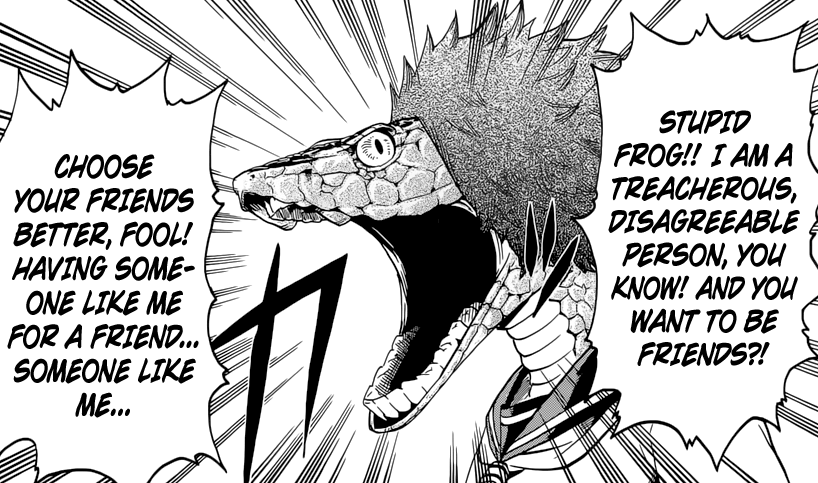Okay, I knew I was going to like this one after the first few chapters, it hit all the right notes for me in terms of character, design, pacing, plotting, and so on. I still think the world building is a bit shakey, but it's no worse than American Superhero comics worldbuilding, so it's not that big a deal.
But the fight between Uraraku and Katsuki sealed the deal and now I love it. I love that Uraraka came up with her own intelligent strategy, even when Deku offered her one because she wanted to prove her own worth. I love that her strategy boiled down to trying to tank the hits of one of the most offensively powerful characters in the manga. This girl has ovaries of goddamn steel. I love that it almost worked. I love that Katsuki took her every bit as seriously as an opponent as he would anyone. I love that anyone who called him an asshole for it got called out on their ignorance and disrespect of Uraraka's capabilities. I love that she was allowed to truly give it her all and kept going until she literally collapsed from injury and exhaustion. It's one big "Fuck you" to everything I hate about how Shonen depicts it's female characters, and it's cathartic as fuck.
The main manga I currently read are Attack on Titan, Hunter X Hunter, Berserk, and One Pice. I have mostly good things to say about the first 3. Not so much about the last one. I read it for various other reasons because I like studying narrative, but I do not enjoy it, and one of the biggest complaints is how it treats women and keeps them away from combat. Because when you have a battle manga...no, when you set up a world that specifically revolves around violence the way OP's does, and you disallow women from participating in that violence on an equal footing, you prevent them from having the kind of agency you give your male characters. It doesn't matter if you give some of them super supporting abilities like expert navigation skills, because when it comes down to it, every event of import is determined by violence in OP, and when NO woman can participate in that... Look, it is a very bad subtextual message and it feeds into a very poisonous cultural norm that I believe every culture should be trying to erase and blah blah blah feminism and shit, but that's not even what I get at when I talk about this stuff. What this does, it just hurts the story itself, because you've rendered half your cast (well, more like a 1/5 in OP's case) idle spectators.
This is a difficult message to actually push through though with words alone and I've earned a great bit of ire from the OP thread trying to get it across. It's just hard to concretely explain why this is so important, how the story of OP, the one the fans are actually enjoying, is actively worse because it disallows it's female characters from being realized to their fullest potential. It's difficult to explain why.
This. This is why. MHA got me invested in it's main heroine's story in 36 chapters of her as a side character than One Piece has in 800+ chapters of Nami because now I know that Uraraka will do things I don't expect her to do. That MHA is willing to throw off conventional restrictions like the idea that men can't ever hit women (and like that is somehow a virtue in and of itself), the notion that women can't ever be hit unless it's by someone whose an irredeemable villain, that women can't fight other men on equal terms, that opens up the story to creative paths that are inaccessible to stories that stick to those traditions. Uraraka has the potential to do ANYTHING in this series, while Nami can't be anything but be a pair of flopping tits that plays in her sad little safe area of the story while the real main characters do everything of actual import (which also limits them in other ways). I don't believe any argument I've ever heard that states this isn't a demonstratively inferior way to tell a story. Just...in terms of sheer mathematics, the kinds of things Uraraka can do now numerically outweigh the things Nami can, for no real reason whatsoever. And every piece of fiction, manga or otherwise, that treats women equally has been able to explore newer and more interesting narratives for doing so.
You don't have to agree that this is the best fight ever or that MHA is better than OP as a manga or anything like that. But now, MHA has more freedom than OP has in how it can weave the narrative arc of an entire subgroup of it's characters, and that is VERY significant to how it MHA will form it's identity as a comprehensive series, and that has me far more excited to see how it will go than OP ever did.



